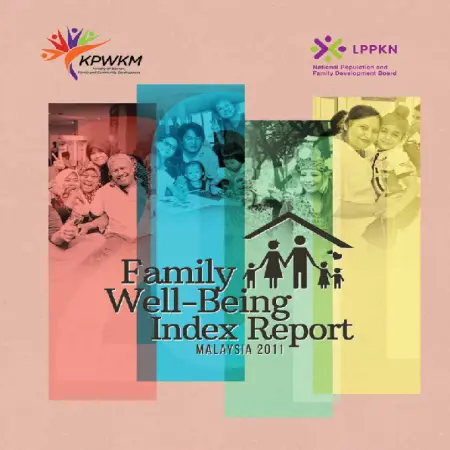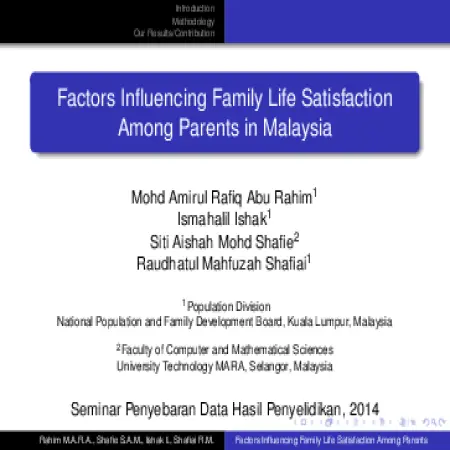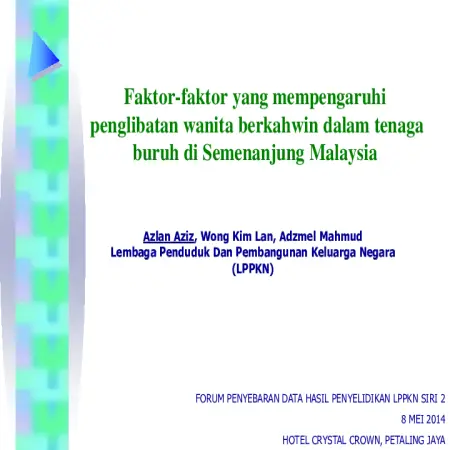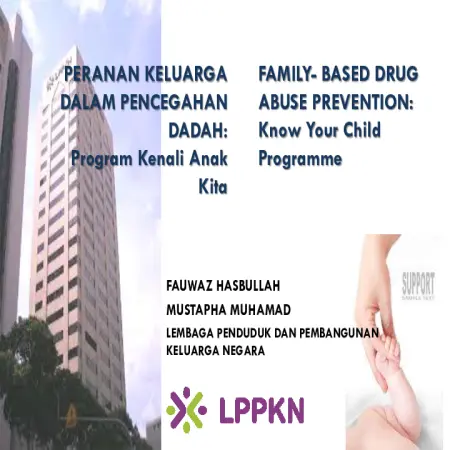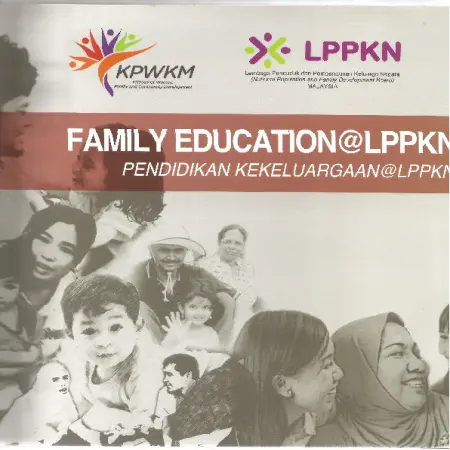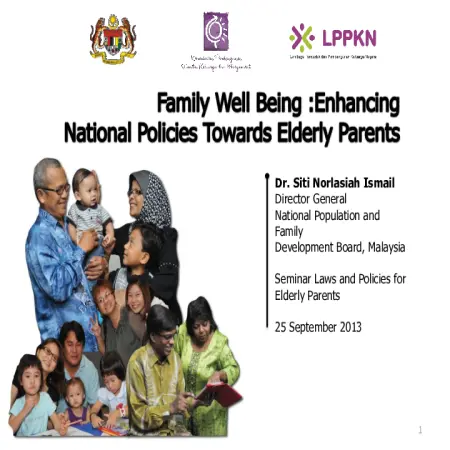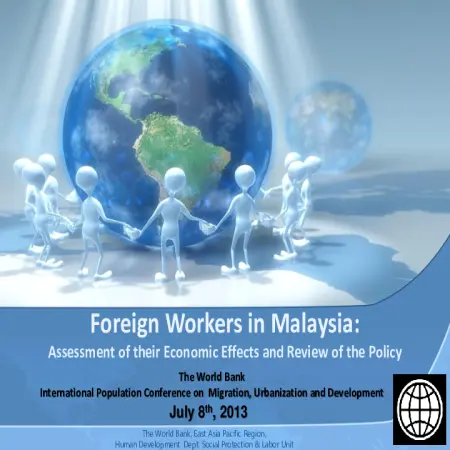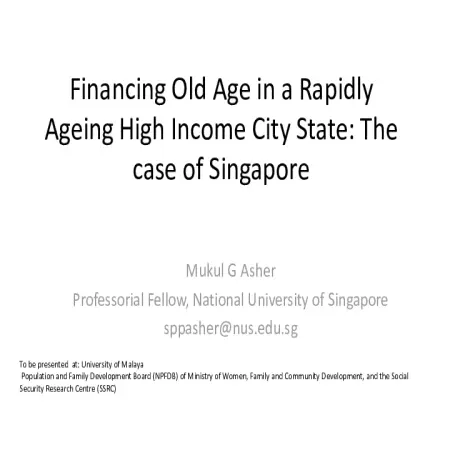Browse by Subject
Results for Search : "300 Social sciences"
|
|
Family Well-Being Index Report Malaysia 2011
Item Type: Research Report
Editor:
Year: 00/00/2015
Abstract: In the past few decades, Malaysia has and is still undergoing a process of rapid social and economic development. This is a result of policies implemented by the government such as the New Development Policy (1991-2000), National Vision Policy (2001-2010) and Government Transformation Programme (2010-2020) which all aim to transform Malaysia into a developed and competitive country. However, the processes has imposed increased demands on the family institution because of the responsibilities and the challenges faced by the family
itself. The family institution must be strengthened to offset the rapid process of social and economic development. This is important because family is the basic social unit which prepares and supplies human capital resources for national development. Given the importance of family well-being to the future of the country, a scientific study needs to be conducted to measure the level of well-being of families in Malaysia. Measuring family well-being is crucial as it can indirectly measure the impact of the implementation of national social and economic development policies on families and the extent to which the implemented policies and programmes are successful or otherwise. Hence, this study has identified suitable indicators that can provide
information about the well-being of families in Malaysia. Subsequently,
based on the identified indicators, a Family Well-Being Index (FWI) was
developed to measure the current well-being of the family as well as
to be used in policy formulation, planning for implementation of future
research, the development of new programmes and services, and
expansion of the existing programmes.
|
|
|
|
|
|
Factors influencing family life satisfaction among parents in Malaysia
Item Type: Conference or Workshop Item
Editor:
Year: 00/00/2014
Abstract: The study attempts to investigate the factors that influence family life satisfaction (FLS) among parents in Malaysia. The study modeled the variable of parental involvement, family functioning, family resilience and time with family as independent constructs. Data for the study was gathered from nationally representative survey of “Family Well-Being Index” study conducted by National Population and Family Development Board Malaysia. Response from 2808 sampled households which involved about 1484 (52.8%) fathers and 1324 (47.2%) mothers of having a child aged at least 13 years old were utilized for the purpose of the current study. A Structural Equation Modeling (SEM) was employed by using Analysis of Moment Structure (AMOS) software. The study found all the modeled independent constructs tested had a significant and direct influence on family life satisfaction among the respondents except for parental involvement construct.
|
|
|
|
|
|
Faktor-faktor yang mempengaruhi penglibatan wanita berkahwin dalam tenaga buruh di Semenanjung Malaysia
Item Type: Conference or Workshop Item
Editor:
Year: 00/00/2014
Abstract: This study is to identify the influences of socio-economic factors towards the labour force participation among married women in Peninsular Malaysia. Bivariate correlations and logistic regression analysis was applied to the data set containing 2,366 married women aged 15-49 years, interviewed during the Fourth Malaysian Population and Family Survey, 2004. It was found that only half of the women were currently working. Chinese had the highest percentage who were currently working as compared to the Malays and Indians. The logistic statistical analysis had also identified several variables which were important determinants of the current work status of married women. Based on logistic statistical analysis, it was found that stratum, previous occupation prior to marriage and presence of young children had significant relationships to women’s participation in the labour force.
|
|
|
|
|
|
Family-based on drug abuse prevention: know your child programme
Item Type: Conference or Workshop Item
Editor:
Year: 00/00/2014
Abstract: This study was to evaluate the effectiveness of the Drug Prevention Program from family perceptive. The respondents was the participants who attended the Know your Child (Kenali Anak Kita) Drug prevention program and sampled by convinence in all the six zones in Malaysia. The aim of this program is to create awareness of family to prevent deviant behaviours, particularly substance abuse among teenagers. The campaign had been implemented phase by phase in six zone involve from various organization, agencies and individual.
|
|
|
|
|
|
Family education@LPPKN = Pendidikan kekeluargaan@LPPKN
Item Type: Book
Editor:
Year: 00/00/2013
Abstract: The National Population and Family Board (NPFDB), agency under the Ministry of Women Family and Community Development which was initially known as the National Family Planning Board (NFPB) was established in 1966 as a statutory body. Its main objective was to implement the National Family Planning Programme but its scope has now been expanded to Population, Family Development and Reproductive Health which is in line with 1984 Amendments Act. The Malaysian family today is facing numerous challenges due to rapid socio-economic development and globalization. New challenges have emerged in the social and economic arena, which have had an impact on Malaysian families. Among the challenges experienced by the family institution are changing family structure and dynamics, balancing family and career, fulfilling economic needs parenting of young children and adolecents as well as weakening marital and family relationships. Parallel with the Government's emphasis on strengthening the family institution, the NPFDB has developed and implemented a wide range of family development programmes encompassing advocacy activities and promotion, training and education, services, research and development (R&D) as well as policy formulation. In December 2010, the Government approved the National Family Policy and its Plan of Action, thus mainstreaming the family perspective in all socio-economic planning and development.
|
|
|
|
|
|
Factors influencing family life satisfaction among parents in Malaysia: the structural equation modeling approach (SEM))
Item Type: Article
Editor:
Year: 00/00/2013
Abstract: The study attempts to investigate the factors that influence family life satisfaction (FLS) among parents in Malaysia. The study modeled the variable of parental involvement, family functioning, family resilience and time with family as independent constructs. Data for the study was gathered from nationally representative survey of “Family Well-Being Index” study conducted by National Population and Family Development Board Malaysia. Response from 2808 sampled households which involved about 1484 (52.8%) fathers and 1324 (47.2%) mothers of having a child aged at least 13 years old were utilized for the purpose of the current study. A Structural Equation Modeling (SEM) was employed by using Analysis of Moment Structure (AMOS) software. The study found all the modeled independent constructs tested had a significant and direct influence on family life satisfaction among the respondents except for parental involvement construct. The findings of the study suggests that some improvement should be made for the parental involvement constructs which covers different aspects of family life satisfaction which will lead the measurement model be more heterogeneous.
|
|
|
|
|
|
Family well being: enhancing National Policies towards elderly parents
Item Type: Conference or Workshop Item
Editor:
Year: 00/00/2013
Abstract: Malaysia will be aged by the year 2030. The objective of National Policy for Older Persons, 2011 is to enhance the respect for and self-worth of the elderly in family, society and nation, to develop the potential of the elderly so that they remain active and productive in national development and to create opportunities for them to continue to live independently and to encourage the establishment and the provision of specific facilities to ensure the care and protection of the elderly.
|
|
|
|
|
|
Foreign workers in Malaysia: assessment of their economic effects and review of the policy
Item Type: Conference or Workshop Item
Editor:
Year: 00/00/2013
Abstract: This study aims to help Ministry of Human Resource to better manage existing human resources in the country and to plan for the development of future human capital needs.
|
|
|
|
|
|
Financing old age in a rapidly ageing high income city state: the case of Singapore
Item Type: Conference or Workshop Item
Editor:
Year: 00/00/2012
Abstract: Singapore, an affluent city state, is among the most rapidly ageing society globally. This is due to low fertility rate (TFR of 1.2 in 2011); and increasing life expectancy (18.3 years for men and 21.8 years for women at age 65 in 2011). Its support ratio (working age persons/elderly) is projected to decline from 7.9 in 2011 to 2.2 by 2030, representing a steep decline. It primarily relies on a mandatory savings tier to finance old age. This tier is administered by a statutory Board called Central Provident Fund (CPF) under the Ministry of Manpower. The CPF has over the years been used not just for retirement, but for housing health care, and other purposes. Its wide scope and mandate has resulted in considerable complexity. This paper provides an assessment of the extent to which the current old age financing arrangements are likely to address longevity, inflation, and survivors’ risks faced by individuals in their old age. Not only each person will need support for a longer period in old age, but societal and individual expectations about old age support are also changing, reflecting the affluent society.
|
|
|
|
|
|
Fertility and religion in Malaysia
Item Type: Conference or Workshop Item
Editor:
Year: 00/00/2012
Abstract: This paper presents a summary of literature review on the subject of religious fertility differential for a research at the Institute of Graduate Studies, University of Malaya and initial results from investigations using the MPFS 41 (Peninsular Malaysia) data. Conceptual frameworks due to Davis and Blake (1956) and Bongaarts (1978) are used to construct a framework of data analysis using SPSS, concentrating on one-way ANOVA and Stepwise Multiple Regression. Next, the influence of religion on age-at-firt-marriage is compared to that of education level, pre-marital working experience and place of residence. Similar to studies done elsewhere, Muslims in Peninsular Malaysia have the highest fertility level and the lowest age at first marriage.
|
|
|
|





